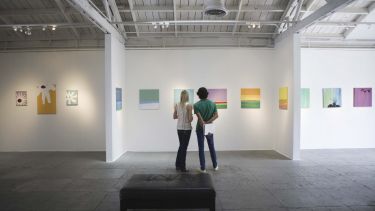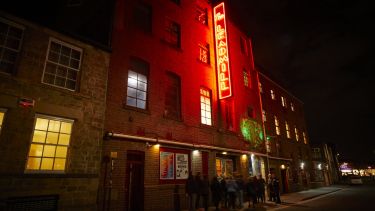- University of Sheffield-commissioned report reveals the economic impact of Covid-19 on the UK’s arts, culture and heritage sector
- Report reveals the sector suffered from a 60 per cent decline in output due to social distancing rules and lockdowns
- Restrictions led to 55 per cent of jobs being furloughed in the sector - the second highest in the UK
- Impact of restrictions varied within the sector - computer games, software, book publishing, TV broadcasting and libraries grew or had modest declines, whereas cinemas, performing arts, museums and historical sites were badly affected
A major new report revealing the economic impact of Covid-19 on the UK’s arts, culture and heritage sector, has been published by researchers at the University of Sheffield.
The report, commissioned by researchers from the University’s Faculty of Arts and Humanities and Faculty of Social Sciences, working with Chamberlain Walker Economics and the South Yorkshire Mayoral Combined Authority, has revealed that the sector suffered from a 60 per cent decline in output - gross value added (GVA) - due to social distancing rules and lockdowns over the past 18 months.
Covid-19 restrictions led to 55 per cent of jobs being furloughed in the sector - the second highest sector in the UK behind the accommodation and food sector - and was well above the national average of 16 per cent.
More than 80,000 claims were made under the Self-Employment Income Support Scheme (SEISS) by people in the arts, culture and heritage sector - 68 per cent of the eligible population in the UK.
Nationally, output in the sector fell dramatically as Covid-19 hit in March 2020 with a decline of around one third from Q2 2019 to Q2 2020 in real terms. The creative, arts and entertainment sub-sector along with the libraries, archives, museums and other cultural activities sub-sector were the worst hit with declines of 63 per cent and 45 per cent respectively.
The annual data is less pronounced in terms of impact because it includes some pre-lockdown activity and varying degrees of re-opening through 2021. However, sector GVA fell by around 20 per cent (real change, constant prices), compared to around 10 per cent for the UK’s economy overall.
These dramatic falls in output mask some significant variations between sub-sectors ranging from an estimated +17 per cent to -70 per cent in nominal rather than real terms.
Activities that grew or were only subject to modest declines (+17 per cent to -five per cent range) in output included; computer games, software, educational book publishing, TV broadcasting and libraries. Activities very badly affected (-30 per cent to -70 per cent range) included; cinema, performing arts, museums and historical sites.
Professor Vanessa Toulmin, Director of City and Culture and Chair in Early Film and Popular Entertainment at the University of Sheffield, said: “The Covid-19 pandemic has had a devastating impact on the UK's arts, culture and heritage sector. This landmark report reveals how social distancing and lockdowns over the past 18 months have had a catastrophic effect on the finances of people who work in the sector, as well as businesses and venues. People have lost their jobs, businesses and venues have closed and this economic impact has severely affected the mental health and wellbeing of people who work in the sector across the UK. People in the sector have been losing sleep and have had much higher levels of anxiety due to how the pandemic has affected their personal finances and uncertainty about the future."
In addition to the national picture, the report used the South Yorkshire region as a case study and drew on research from the University of Sheffield into how Covid-19 restrictions have affected the region’s arts, culture and heritage sector.
The research revealed that the sector in South Yorkshire is one of the most affected by Covid-19 across the UK with an estimated sector output loss of 22 per cent - five per cent more than the UK average. This is thought to be because South Yorkshire has the highest share of jobs in the hardest hit sub sectors of arts, culture and heritage.
Findings from the study captured the experiences of venues, freelance workers and audiences in South Yorkshire throughout the pandemic. A major finding from the research revealed that lockdowns and restrictions have had a profound impact on the economic circumstances and wellbeing of freelance workers.
The study in South Yorkshire revealed:
- 76.5 per cent of the freelancers who completed the survey reported that their mental wellbeing was worse since the start of lockdown. Male respondents, under-30s, and respondents with a diagnosed mental health condition experienced even greater levels of distress.
- Personal finances, unemployment and the ability to cover overheads were causing respondents to lose sleep. Worry over personal finances and unemployment was much higher amongst these respondents than the general population.
- South Yorkshire freelancers also rated lower levels of wellbeing and happiness and higher levels of anxiety than the general public. Their mental health was being impacted by loss of work, isolation, and uncertainty about the future, with restrictions leading to a sense of lost identity, skills and motivation amongst freelancers. Freelancers experienced pressure to retrain and find alternative work, whilst having spent a life-time to set up their arts business and be financially independent.
- Event crew, lighting and sound engineers reported greater worsening of mental health than respondents in other roles, with 53.8 per cent saying that their mental health was “much worse” compared to 25.5 per cent on average. They reported far worse scores across the four wellbeing factors used in the study.
Kate Brindley, Arts, Culture and Heritage Project Director, South Yorkshire Mayoral Combined Authority said: “This important research provides crucial, regional-specific evidence needed to understand the full effect that the pandemic has had on our creative and cultural businesses, organisations, and individuals.
"These sectors are vital to our economy, civic identity, and quality of life in South Yorkshire. The Mayoral Combined Authority and partners are committed to developing a coherent regional strategy for the sector, launching bespoke business support tools for the creative sectors, and investing an additional £1million into arts and culture over the coming months to aid their recovery.
“As well as this immediate response, we recognise the need to keep pushing for additional funding from government to aid the recovery of the region’s cultural and creative sector, to ensure the people of South Yorkshire have the same opportunities afforded to them.”
Professor Vanessa Toulmin, added: “Through this research we have been able to get frank and honest feedback on the effect of Covid-19 on our wonderfully creative and resilient cultural, arts and heritage sector here in the South Yorkshire region. We have heard from freelancers who have experienced significant financial loss as well as anecdotal evidence of the impact on wellbeing from audiences who had a lack of opportunity to access arts and culture.
“Being able to work with our partners to provide this critical evidence as well as continuing to support the regional cultural, arts and heritage sector recovery is a role the University of Sheffield is proud of and deeply committed to through our Made Together programme; we are sure that the unique vibrancy of South Yorkshire’s towns and cities will soon be back.”
Professor Malcolm Tait from the University of Sheffield's Department of Urban Studies and Planning, added: "The impact of Covid on our arts and culture sector has been significant. Our research project has drawn together a large volume of evidence, with the highly valuable input of many of those who work in the sector in South Yorkshire. This has revealed both the scale of the challenge facing many arts and culture organisations and workers, but also the creativity and resilience of many responses.
“We are looking forward to feeding back our findings to colleagues in the arts and culture sector in South Yorkshire, and gathering their responses. We hope that this will help to generate wider discussion of the role of arts and culture in the region, and what we might do to support it over the coming years."
The report was written by ChamberlainWalker Economics and was commissioned by a UKRI/AHRC-funded project ‘Responding to and modelling the impact of Covid-19 for Sheffield’s cultural ecology: A case study of impact and recovery’ which took place between July 2020 and October 2021. Grant number AH/V008668/1
Contact
For further information please contact:





